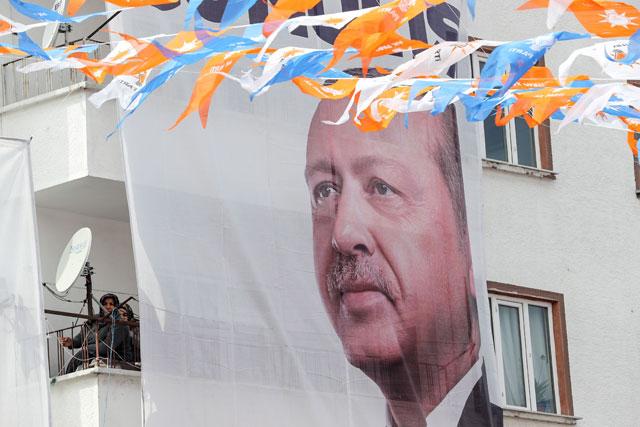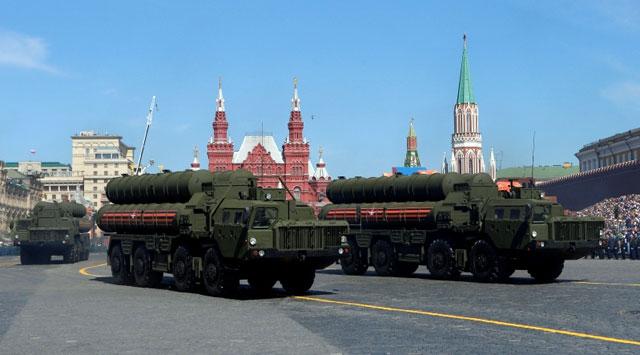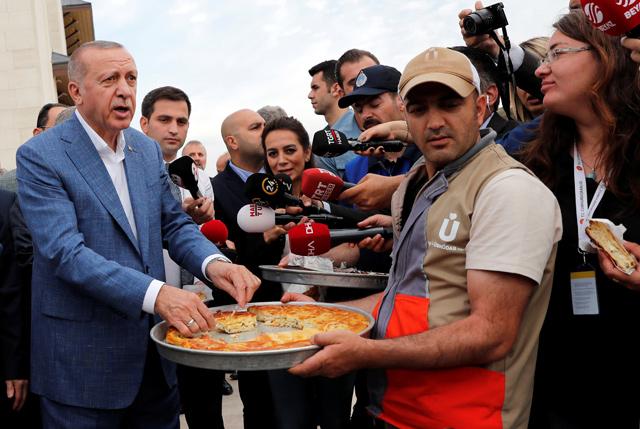You are here
Erdogan juggles Moscow, Washington over Russia missile deal
By AFP - Mar 28,2019 - Last updated at Mar 28,2019

Women sit on a balcony next to a portrait of Turkish President Recep Tayyip Erdogan during an AKP (Justice and Development Party) campaign rally ahead of the local elections in Ankara, Turkey, on Thursday (AFP photo)
ANKARA — A deal to buy Russian missiles has left Turkish President Recep Tayyip Erdogan balancing NATO ally the United States and new regional partner Russia as he risks fallout from both Washington and Moscow.
Turkey's already soured relations with the United States could be significantly damaged with possible US sanctions if Ankara pushes ahead with the deal for the sophisticated S-400 missile defence system.
US officials have repeatedly warned the deal could threaten Turkey's participation in the F-35 stealth fighter jet programme.
But should Ankara renege on the missile purchase, Erdogan risks alienating Russia at a time when Moscow has become a pragmatic partner in Turkey's strategy in Syria.
At risk would be a deal between Russia and Turkey to stop a Syrian regime offensive in a province controlled by extremists.
Moscow would also likely hit back economically, experts say, perhaps by stopping millions of Russian tourists coming to Turkey.
Sanctions or fallout from either could not come at a worse time with Turkey's economy in recession for the first time since 2009 following a currency crisis last year.
US sanctions that helped trigger that turmoil showed just how exposed Turkey's economy can be.
US Department of Defense spokesman Charlie Summers recently warned Ankara faced "grave consequences" if Turkey took the S-400s, a serious threat according to analysts.
"The US government and Congress are not making idle threats when they warn Turkey not to proceed with the purchase of Russian S-400s," Amanda Sloat, a senior fellow at the Brookings Institution, said.
"There are serious concerns in Washington as well as Europe about a NATO ally purchasing Russian defence equipment."
The Americans fear technology from the S-400s would be able to gather data from NATO aircraft and allow Russians to access this information.
"There is the NATO set of issues of buying material that won't be NATO interoperable and the effect that will have on alliance interoperability," a senior US official said.
‘Out of question’
Erdogan says the S-400s are needed to protect Turkey's borders and said he turned to Russian equipment because no acceptable US missile deal was available at the time.
The first S-400 delivery is expected in July.
"For us to turn back from the deal is out of the question," Erdogan said recently.
That could risk Ankara being sanctioned by Washington under the Countering America's Adversaries Through Sanctions Act (CAATSA), experts say.
Under CAATSA, any entity doing business with Russia's state and private defence and intelligence sectors risks sanctions.
Foreign Minister Mevlut Cavusoglu said last year Turkey would "absolutely respond" to any US sanctions.
US officials have repeatedly said Turkey's involvement in the F-35 stealth fighter programme should be curtailed if the Russia deal goes ahead.
Turkey plans to buy 100 F-35s and some Turkish pilots have already started training with counterparts in the US.
US General Curtis Scaparrotti this month reiterated that Washington should block delivery of the F-35s if Ankara completes the Russia agreement.
Turkey has invested over $1 billion in the F-35 programme and any US decision to prevent the fighters reaching Turkey would be a breach of contract, but there are indications that Washington would be prepared to repay Ankara.
Time is short
Hoping to supply an alternative to the S-400, Washington approved the sale of Patriot missiles to Ankara last year.
Turkey has no air defence system though NATO allies temporarily deployed Patriots to help defend the country from attack by Syrian jets in 2013.
Acting US Defence Secretary Patrick Shanahan on Tuesday said Turkey was "absolutely" wanted in the F-35 programme but added: "we need Turkey to buy the Patriot."
"We're doing our best to give them as real and as credible and as urgent an alternative as possible," the senior US official, who requested anonymity, said.
Cavusoglu on March 1 said Patriot negotiations had begun after a "positive" response.
But time is short. The formal offer for the Patriot expires at the end of March, according to media reports.
US-Turkey ties are already at a low point with tensions over US support for a Syrian Kurdish militia viewed as terrorists by Ankara, and Washington's failure to extradite a Muslim preacher accused by Turkey of ordering a 2016 coup attempt.
Last summer, ties between the NATO allies hit another low with tit-for-tat sanctions and the US doubling steel and aluminium tariffs on Turkey over the case of a jailed American pastor.
That battered Turkey's lira and the pastor was freed in October.
The missile row is "unlikely to cause a permanent rupture", said Sloat, a former US State Department official. "It will significantly strain already challenged relations and raise further questions in Washington about whether Ankara is a reliable ally."
Part of the concern is the burgeoning relationship between Erdogan and Russian President Vladimir Putin, with the Turkish leader expected in Russia in April.
While Turkish and US officials are talking privately, top-level discussions will likely wait until after Turkish local elections on Sunday.
Hande Firat, a Hurriyet daily columnist, said Cavusoglu will meet with US Secretary of State Mike Pompeo on a US trip in April and would likely discuss the S-400 dispute.
"How this will develop, we will see after the elections," she wrote on Tuesday. "But discussions between US President [Donald] Trump and President Erdogan will be key."
Related Articles
ANKARA — Turkey will not turn back from its deal to buy S-400 missile systems from Russia, President Recep Tayyip Erdogan was quot
ISTANBUL — President Recep Tayyip Erdogan on Tuesday said Turkey would not withdraw from a deal made with Russia to buy an S-400 m
ANKARA — Turkey warned on Wednesday that it could buy jets and additional air defence systems from Russia if it cannot get Patriot miss



















